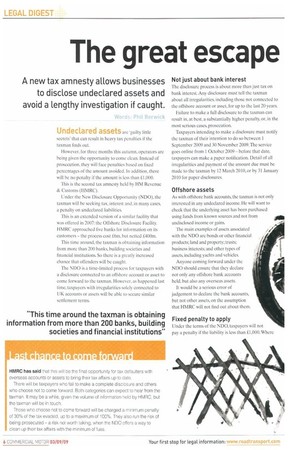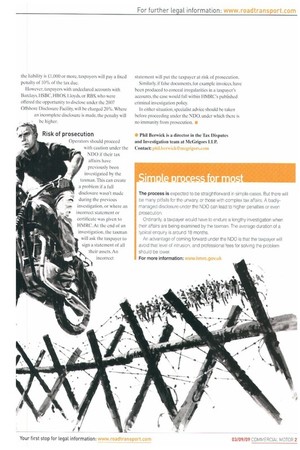The great escape
Page 26

Page 27

If you've noticed an error in this article please click here to report it so we can fix it.
A new tax amnesty allows businesses to disclose undeclared assets and avoid a lengthy investigation if caught.
ikiti Lievwick Undeclared assets are 'guilty little secrets' that can result in heavy tax penalties if the taxman finds out.
However, for three months this autumn, operators are being given the opportunity to come clean. Instead of prosecution, they will face penalties based on fixed percentages of the amount avoided. In addition, there will be no penalty if the amount is less than £1,000.
This is the second tax amnesty held by HM Revenue & Customs (HMRC).
Under the New Disclosure Opportunity (NDO), the taxman will be seeking tax, interest and, in many cases, a penalty on undeclared liabilities.
This is an extended version of a similar facility that was offered in 2007: the Offshore Disclosure Facility. HMRC approached five banks for information on its customers — the process cost „Om, but netted £400m.
This time around, the taxman is obtaining information from more than 200 banks, building societies and financial institutions. So there is a greatly increased chance that offenders will be caught.
The NDO is a time-limited process for taxpayers with a disclosure connected to an offshore account or asset to come forward to the taxman. However, as happened last time, taxpayers with irregularities solely connected to UK accounts or assets will be able to secure similar settlement terms.
Not just about bank interest
The disclosure process is about more than just tax on bank interest. Any disclosure must tell the taxman about all irregularities, including those not connected to the offshore account or asset, for up to the last 20 years.
Failure to make a full disclosure to the taxman can result in: at best, a substantially higher penalty, or, in the most serious cases, prosecution.
Taxpayers intending to make a disclosure must notify the taxman of their intention to do so between 1 September 2009 and 30 November 2009. The service goes online from 1 October 2009 before that date, taxpayers can make a paper notification. Detail of all irregularities and payment of the amount due must be made to the taxman by 12 March 2010, or by 31 January 2010 for paper disclosures.
Offshore assets
As with offshore bank accounts, the taxman is not only interested in any undeclared income. He will want to check that the underlying asset has been purchased using funds from known sources and not from undisclosed income or gains.
The main examples of assets associated with the NDO are bonds or other financial products; land and property; trusts; business interests; and other types of assets, including yachts and vehicles.
Anyone coming forward under the NDO should ensure that they declare not only any offshore bank accounts held, but also any overseas assets.
It would be a serious error of judgement to declare the bank accounts, but not other assets, on the assumption that MARC will not find out about them.
Fixed penalty to apply
Under the terms of the NDO, taxpayers will not pay a penalty if the liability is less than £1,000. Where the liability is £1,000 or more, taxpayers will pay a fixed penalty of 10% of the tax due.
However, taxpayers with undeclared accounts with Barclays, I IS BC. HBOS, Lloyds. or RBS, who were offered the opportunity to disclose under the 2007 Offshore Disclosure Facility, will be charged 20%. Where an incomplete disclosure is made, the penalty will he higher.
Risk of prosecution
Operators should proceed with caution under the NDO if their tax affairs have
previously been investigated by the taxman. This can create a problem if a full disclosure wasn't made .1.1 during the previous -,401, investigation, or where an Al■ incorrect statement or certificate was given to FIMRC. At the end of an investigation, the taxman will ask the taxpayer to sign a statement of all
their assets. An incorrect statement will put the taxpayer at risk of prosecution.
Similarly, if false documents, for example invoices, have been produced to conceal irregularities in a taxpayer's accounts, the case would fall within HMRC's published criminal investigation policy.
In either situation, specialist advice should be taken before proceeding under the NDO, under which there is no immunity from prosecution. S




































































































































